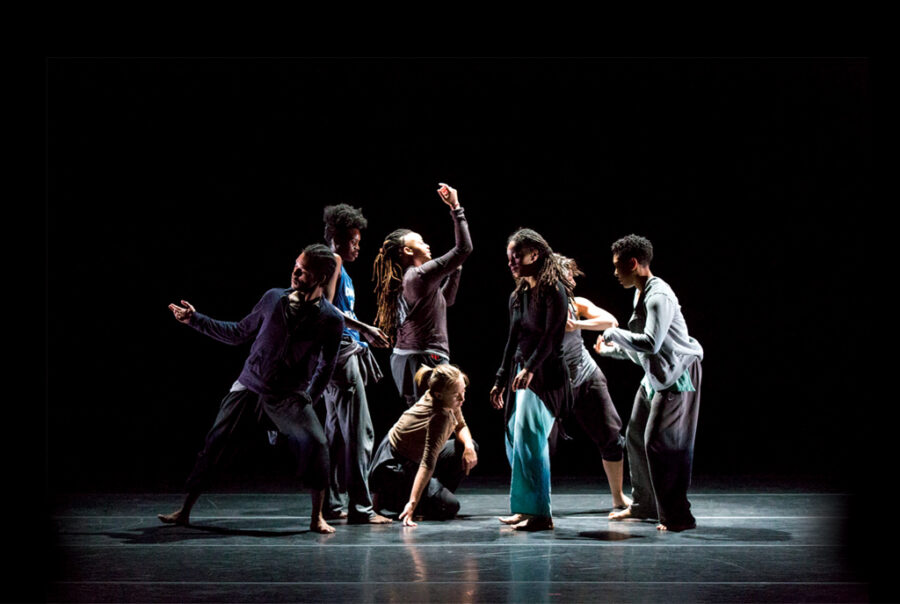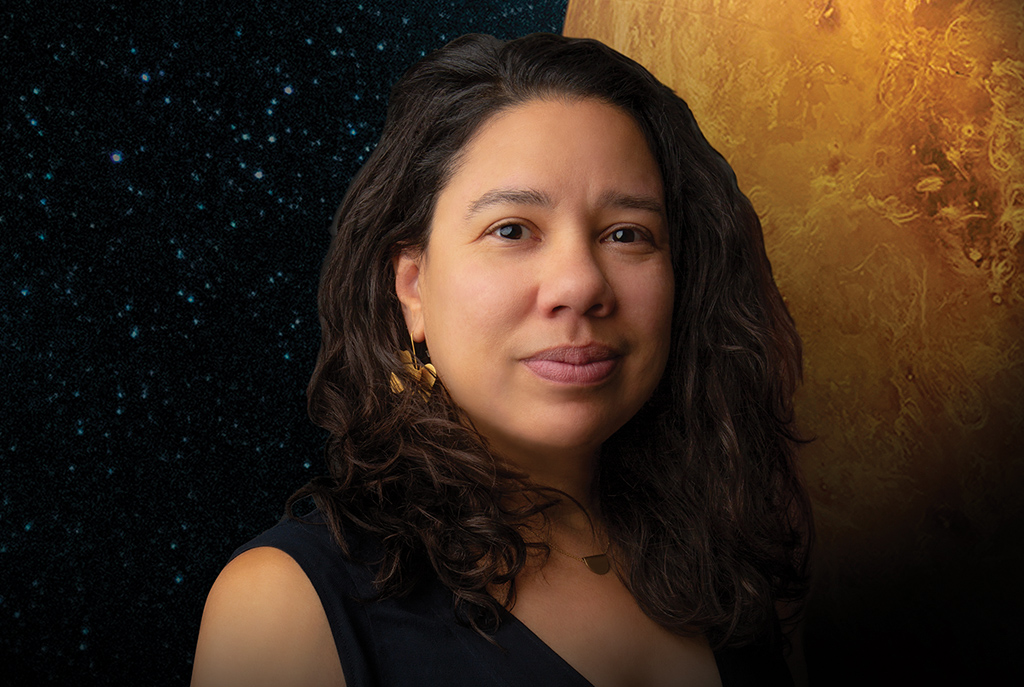College Interrupted
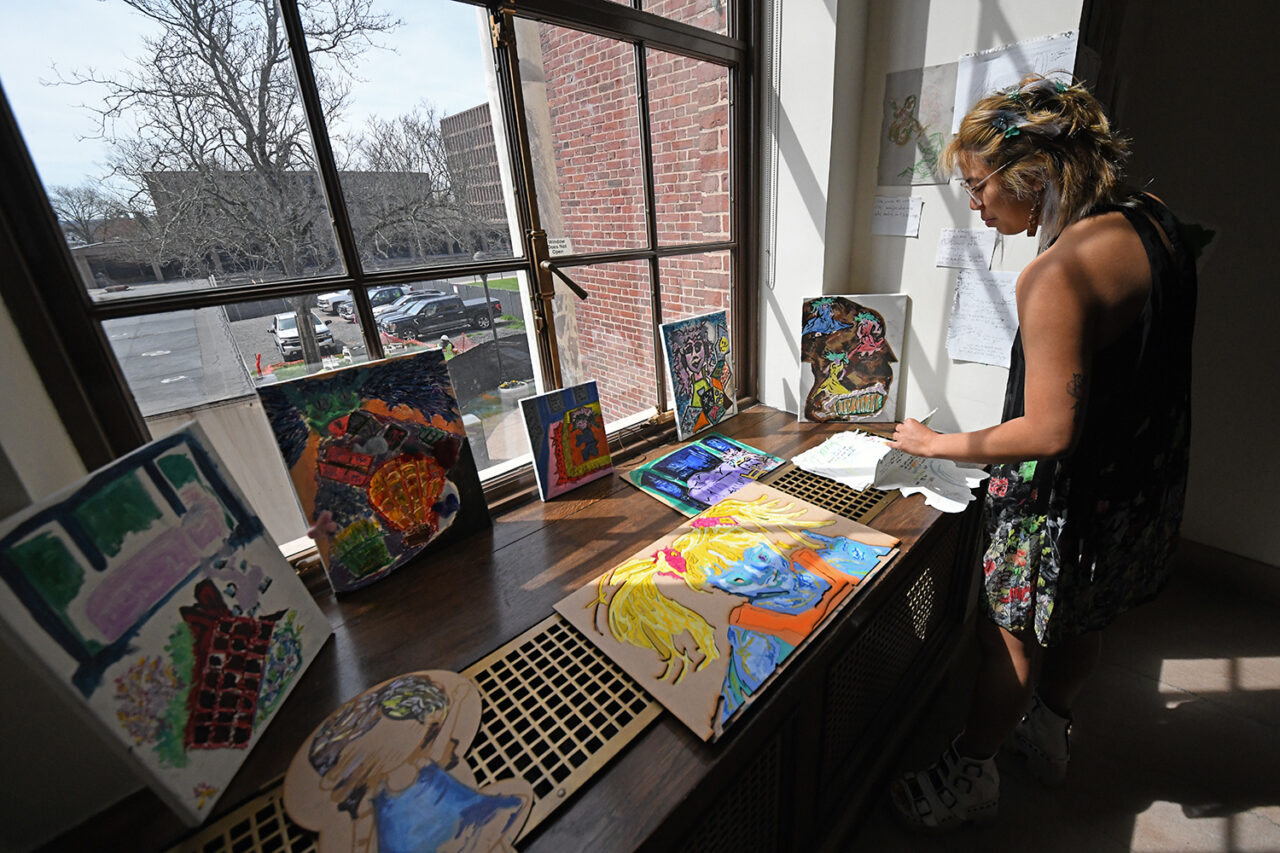
While every Commencement and every class is special in their own way, the Class of 2022 graduates stand out not only for their individual achievements, but also for the particular arc of their undergraduate career, one that started in traditional Wesleyan fashion with the full first-year experience and ended with efforts to regain a sense of normalcy after nearly two years of severe COVID-19 restrictions.
We asked seniors to reflect on their time at Wes—their theses, capstones, and proudest achievements—and to share with us their plans for the future. While their responses reveal the impacts of sophomore and junior years heavily affected by COVID, the overarching spirit that comes through is of a class that has weathered more than their share of adversity, and in usual Wesleyan fashion, has found a way to adapt and come out of it with their own take on lessons learned. As Senior Class Dean Michael Guerrero notes, “These students are resilient. They are problem-solvers and solution-focused. They have built so much grit—to take a difficult situation, break it down, and move forward. And they’re not just standing on the sidelines. They are advocates, trying to help where they can, trying to learn, with empathy and understanding. I think that we’re going to get really good leaders out of this group, because these students know how to face a stack of problems and not overreact. That flexibility, that presence of mind, intellectual curiosity, and deep empathy for others—you can see it in the Class of 2022.”
Elim Lee (she/her)
English; IDEAS and Data Analysis minors
Columbus, GA
For her senior art studio thesis, Elim Lee created a living book inside Olin Library. Needle and the Too Big World tells the story of a little girl who is overwhelmed by everything unknown in the world but learns to use her creativity to find a way to navigate through it.
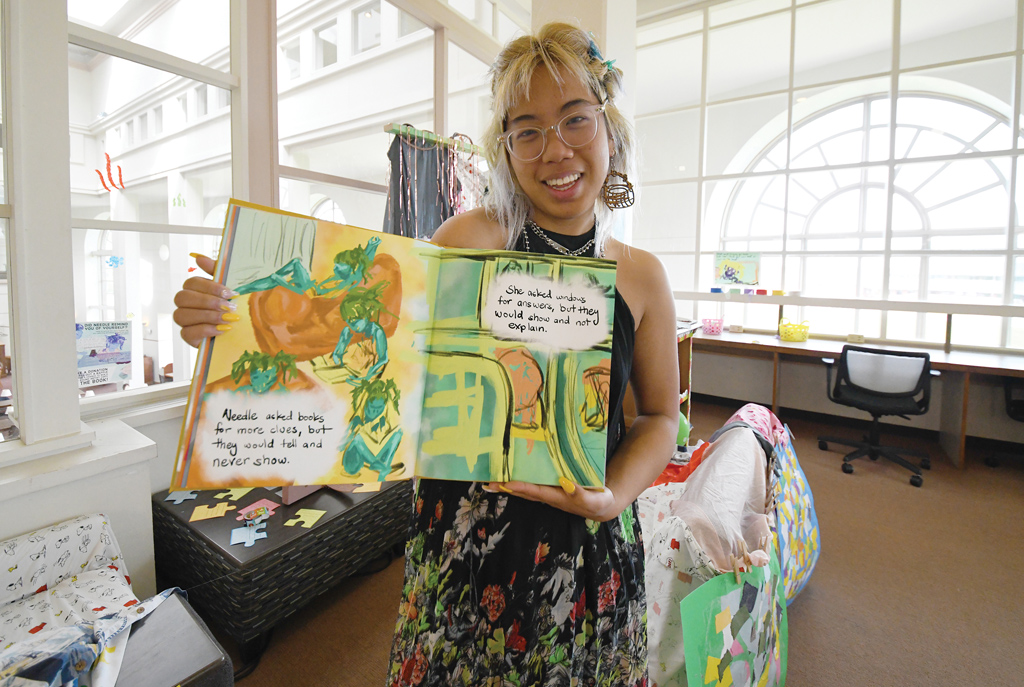 “I’ve felt overwhelmed by my emotions my entire life. It really wasn’t until Wesleyan that I started to realize that I could live through them differently. The entire college experience, the emotional speed of it all, the condensed coming-of-age reprise, it all made me have to think through the effectiveness of big emotions. It felt like there was a way to make room for everything while also not letting it take over completely, and I just couldn’t believe it took me two decades to get there. I love joking that my life would have been so different if I had mastered self-soothing as a crying toddler in the crib. And I think the idea came from that. What if, as a child, someone accepted all my questions, but also reassured me that unknown answers were also okay?”
“I’ve felt overwhelmed by my emotions my entire life. It really wasn’t until Wesleyan that I started to realize that I could live through them differently. The entire college experience, the emotional speed of it all, the condensed coming-of-age reprise, it all made me have to think through the effectiveness of big emotions. It felt like there was a way to make room for everything while also not letting it take over completely, and I just couldn’t believe it took me two decades to get there. I love joking that my life would have been so different if I had mastered self-soothing as a crying toddler in the crib. And I think the idea came from that. What if, as a child, someone accepted all my questions, but also reassured me that unknown answers were also okay?”
“I learned a lot of English by reading, and taught myself a lot of wrong pronunciations. So I didn’t want any of my work to be inaccessible. I wanted the book to be strong enough visually that a story could be seen even without text. I wanted it to come to life in a visual and tactile form that you could explore. And I used common handmade materials so that everyone could feel like this could easily be pulled out of their own closets and minds.”
Kevonte Payton (he/him)
History and Government
New Orleans, LA
In his four years at Wesleyan, Kevonte Payton has committed himself to helping overlooked communities, working to bridge gaps and create solutions. During the pandemic, Payton started a free tutoring program offering ACT prep, math and writing workshops, and FAFSA help to high school students in his community because “I wanted to give back and take down this barrier [of] lack of financial resources.” A Peter Morgenstern-Clarren ’03 Social Justice Award recipient and Wesleyan Black Alumni Council Award winner, Payton’s focus remains steady on a future of continued impact and civic engagement.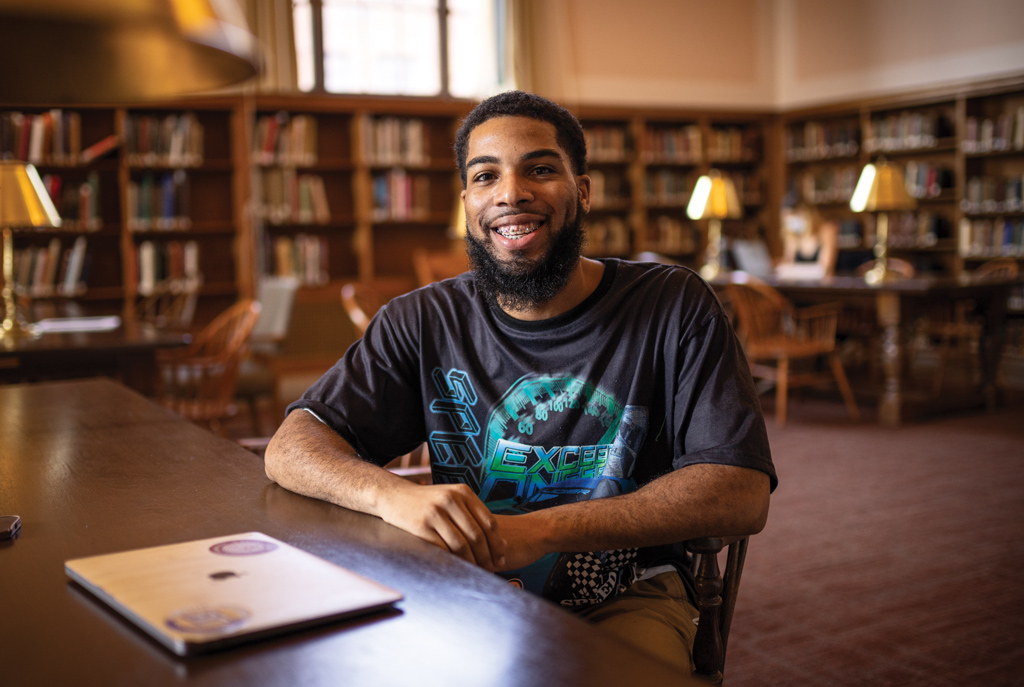
“Though I do plan on going to law school in the future, I decided to take a two-year gap to give myself a mental break before jumping right back into school. With the gap year I plan on working for M&T Bank helping diversify the company in New York. Then some time after that and after law school I will be running for senate of the state of Louisiana and then president of the United States in 2035. Mark my words.”
“Honestly I am proud of the way I successfully established myself not only within the Wesleyan community with dance, admissions work, and research, but also outside the community and into the greater Middletown area. I have tutored, worked with the Black community, and built genuine relationships with many Middletown residents thanks to the resources provided to me by Wesleyan.”
“I see a huge difference in the way I approach situations now compared to when I used to. When I first came to Wes, I felt like I did not belong here at all. Hearing how the students talked and addressed America’s issues in my first-year intro government class made me feel afraid to speak. I thought people would think that I was some dumb Black kid from the South with a weird accent. However, that was not the case at all. Once I gained more confidence in myself (shout out to my friends) and in my knowledge, I never stopped giving my take on things in class.”
“Graduating and being a Wesleyan alumnus to me just means joining an even bigger community/network of passionate people hoping to change the world in some way, shape, or form.”
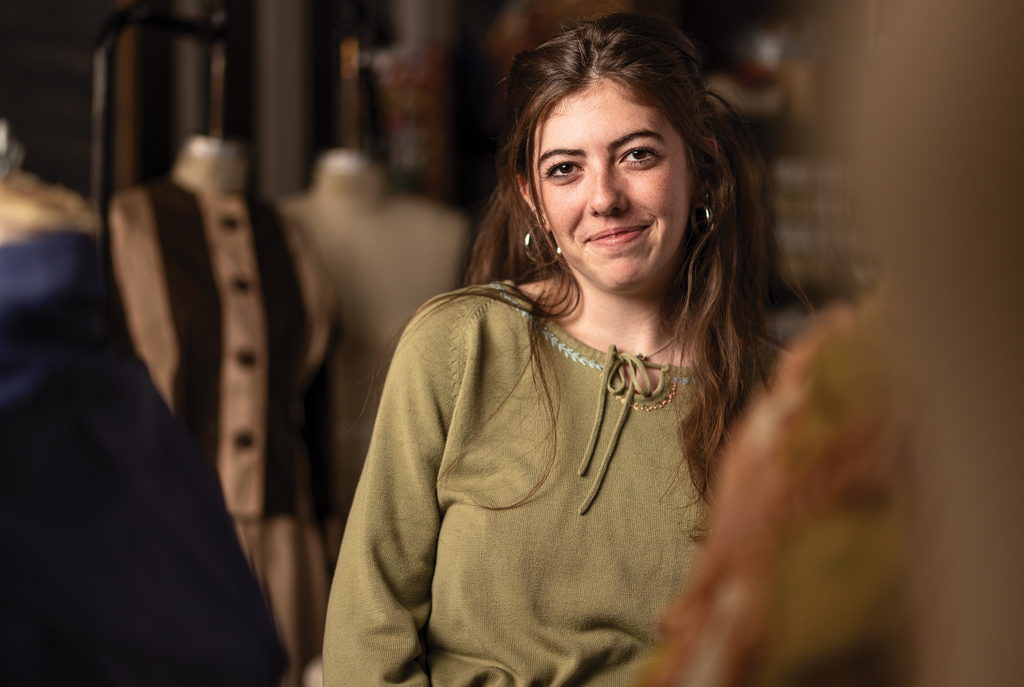 IZZY KOFF (she/her)
IZZY KOFF (she/her)
Mathematics, Theater
Kensington, MD
A tutor for the Center for Prison Education, women’s rugby player and social chair, Costume Shop worker, Red and Black Café barista, and program designer for the Spring Department Show, Izzy Koff has had a busy senior year. She also completed a Costume Design capstone showcasing American protest clothing in the format of a living museum, examining the Suffragettes, the Civil Rights Movement, the Black Panther Party, the Equal Rights Amendment Marches, the AIDS crisis, and the Pride Parades in an innovative way that helped audiences see how clothing could “be a tool to change society.” Not to mention preparing for a future in medicine and her end goal to work with incarcerated people as a doctor in a community-oriented practice. For Koff, her time at Wes has been spent not only making the most out of the opportunities available to her and making her own mark, but also recognizing the ways in which the experiences of each class can overlap, connect, and set the path for those who come after.
“Because we were the only [current undergraduates] to get a full year of pre-pandemic Wesleyan, the onus was on us to carry on Wesleyan culture post-COVID. There were a lot of ways we could have failed, but I really think we pulled together and brought back tradition while making everything more inclusive. In essence, we had this ability to impact the culture here and we did so for the better. As a grade we stepped up as leaders and have done an excellent job of showing underclassmen all the things that Wesleyan can be for them. And I hope we’ve made enough of an impact to keep Wes weird in this old but new way for years to come.”
“My dad was in the Class of ’89 and knew probably since I was in middle school that Wesleyan was the place that I would and should end up. But what I really appreciate is that he never forced it on me. It was always my choice. And eventually I came to the right choice. We had two polar opposite Wesleyan experiences, but there is something very comforting that I’m existing in the same space. When I go to the SciLi vending machines, I like the fact that it is the very spot where his friend used to drag him to get 25-cent coffee. It’s almost like his stories of college were fables of my childhood and now I get to add a new chapter.”
“Next year I will be joining Epic Systems as a technical solutions engineer. Epic Systems is one of the largest electronic medical record software companies in the country and is also expanding internationally. I’m excited to learn to code and help out hospital systems to ensure the best patient care possible. Hopefully, I will spend a few years at Epic then begin the path towards medical school.”
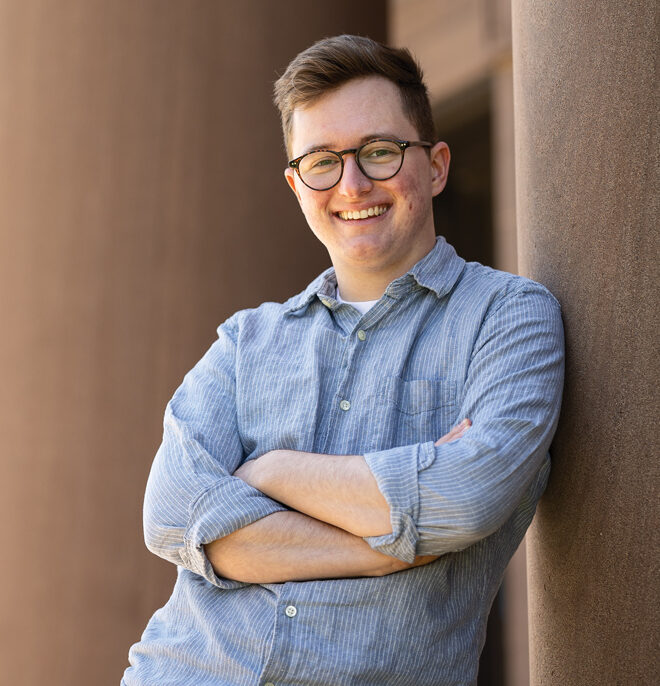 Ori Cantwell (he/him)
Ori Cantwell (he/him)
Psychology; Religion minor, Certificate in Applied Data Science
Washington, DC
Ori Cantwell’s interdisciplinary interests might seem disconnected at first, but to him they “absolutely intersect,” opening up new ways to learn and communicate ideas as well as process the group dynamics of his own graduating class.
“Religion came first and was a way to study group dynamics and rituals. I chose psychology because I wanted to research how people think. When I found the Quantitative Analysis Center, I realized that there were all of these quantitative ways to tell stories that were different from clinical research and library research.”
“I did an interdisciplinary thesis that takes a mixed-methods approach to analyzing the in-group dynamics of QAnon online spaces, with a particular focus on how QAnon empowers its believers to imagine their own version of the American nation. I used modeling methods from data science to simulate how a single QAnon belief would spread through different populations, and tried to understand the quantitative differences in QAnon in-group and out-group dynamics. It’s easy to make fun of conspiracy theory movements, but the internet is this virtual experience of communication that generates reality, and we can’t dismiss the power that it has to shape people’s lives.”
“The Class of 2022 is the last class to have had a full year at Wes pre-pandemic, and that’s bonded us to a sense of Wesleyan tradition and ritual around social events like Spring Fling or WesRave. I’ve really appreciated that sense of continuity each year…. It’s like everything my class is doing connects us to the students who were in our position the previous year and the year before that and before that.”
Nina Criswell (she/her)
Art Studio, Computer Science
San Francisco, CA

Nina Criswell chose Wesleyan over art school because she wanted to be able to pursue her love of math and physics alongside her passion for painting. But through the course of her journey, and following the example of Wes Art Studio alums before her, she discovered a new vocation in architecture that allows her to combine both her logical/technical side with a strong creative component.
“For my thesis I made six large-scale oil paintings that are all cohesive around a central theme of pairing physical spaces with images of the body. I’m thinking a lot about how these two images in each painting are in dialogue with each other, both in a way that brings up some element of discomfort, or shows the private versus the public and the body versus the rigidity or stability of the architectural space. . . . It’s the culmination of my artistic process and journey at Wesleyan.”
“The most important part of my thesis for me was stepping out of my comfort zone and thinking more broadly about the way in which we live in the world. I love painting, but it’s just so inherently self-indulgent. My architecture classes make me feel like I have more potential to create an impact on the world around me. I’m excited about architecture and the innovations making buildings more environmentally sustainable and accessible to a wider audience. I’ve always felt like it had so much more of a direct impact on the way in which we live, individually but also collectively, and that’s something I really care about.”
Manuel Dominguez (he/his)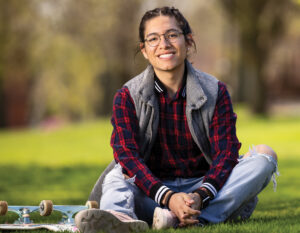
Latin American Studies; Global Engagement and History minors
Quinlan, TX
Manuel Dominguez, a Questbridge scholar from Texas, came from a small community where most students go to community college and few go to a state college. Dominguez has spent much of his undergraduate years focused on investigating what it means to graduate from an institution like Wesleyan and how he can use that knowledge to speak out more and help his community.
“I’ve learned a lot about communication. I was really introverted up until I was a senior interviewer. I applied for the position because I wanted to be able to be more open about things and to think about how I was conveying things to other people. It really helped me open up and was a really empowering experience. Most universities don’t give seniors the opportunity to partake in the journey of what it takes to admit different types of students from around the world. It’s been a crazy experience. There are so many different young individuals that are doing so much more than I was in high school. It’s given me hope that there are people that want to make change and actually perform it, and are able to talk about it in a way that helps their communities. People from California, from Texas, New York, but also India, Bangladesh, and Pakistan. They are able to do things in a very similar way of interconnectedness that the internet has been able to provide and that really interests me. I’ve been able to rethink how that process works within Wesleyan and I’ve loved it.”
Photos of Elim Lee and Nina Criswell by Olivia Drake MALS ’08; all others by Tom Kates

